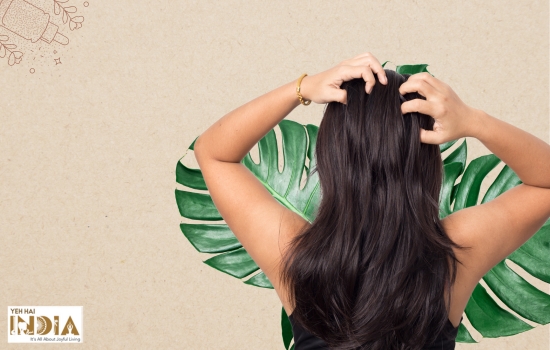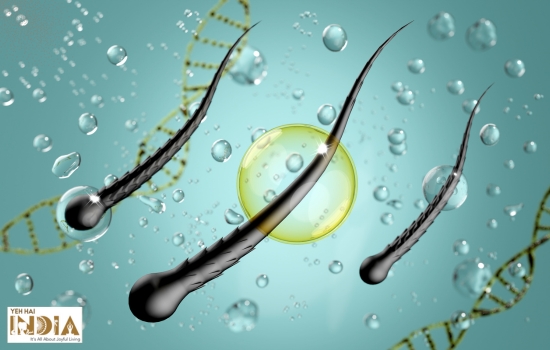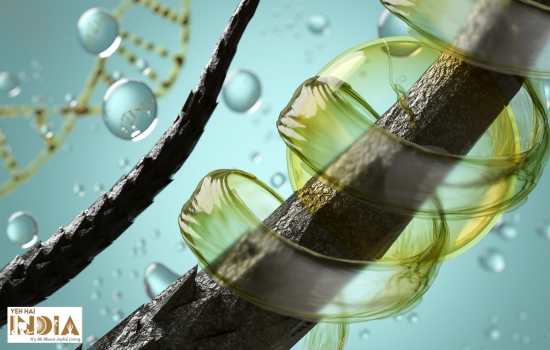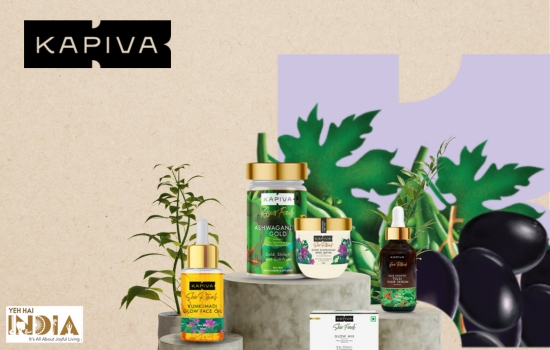The focus of this article is to have a better grasp of biotin and its potential benefits and how it might help you achieve vibrant, robust locks.
Hair not only enhances personality but also plays a significant part in self-confidence, making individuals yearn for healthy and beautiful hair. Hair-related problems, such as receding hairlines, thinning, and delayed development, can be aggravating and cause self-consciousness.
Fortunately, there are numerous products and treatments available in the marketplace that claim to solve these hair difficulties.
Biotin Supplements – A Popular Remedy for Hair Growth
This is one of the popular products that has attracted interest for its potential role in stimulating hair development. Biotin, frequently referred to as vitamin B7 or vitamin H, is a water-soluble B-complex vitamin.
Biotin has grown in prominence in the hair care industry in recent years. It is thought to strengthen hair follicles and encourage healthy hair development. With so much literature available, it’s critical to grasp the science underlying this B vitamin and its potential hair benefits.
Let us look more closely at the relationship between biotin and hair development by understanding how it works and its integration into a hair care regime.
So, let’s dive into the world of biotin and learn about its potential involvement in hair development.
Understanding Biotin for Health
Biotin belongs to the family of B-complex vitamins and is essential for overall body health and function, as it is necessary for energy metabolism and other physiological activities.
It works as a coenzyme for multiple enzymatic activities that are important for metabolising protein, carbohydrates, and lipids. Such processes are inevitable as they turn food into usable energy for our bodies.
This B vitamin is also involved in gene expression and fatty acid production.
Optimal levels contribute to maintaining healthy and strong hair. Along with hair, this vitamin is also essential for skin and nails as well. It participates in the synthesis of keratin, a protein that is the building block of hair, skin, and nails.
It is also needed for the constant functioning of the neurological system and aids in the maintenance of healthy brain function and the synthesis of neurotransmitters.
Recommended Article: 10 Natural Hair Oils for Effective Hair Growth
Natural Availability of Biotin

Eating a well-balanced diet can help ensure an appropriate intake of this vitamin. Food sources include:
- Egg yolks
- Nuts and seeds (walnuts, groundnut, almonds, sunflower seeds, etc.)
- Whole grains like oats, barley, etc.
- Legumes like chickpeas, lentils, and soybeans)
- Dairy products
- Cruciferous vegetables
Hair and Biotin
Even though the relationship between biotin and hair growth is complicated, it has gained significant attention for its role in hair health.
There is evidence that a deficiency of this vitamin can contribute to deteriorating hair growth.
Keratin is a protein that serves as the structural component of hair and needs biotin for its formation. Therefore, a shortage of this vitamin can impair keratin formation, resulting in brittle hair strands that are vulnerable to breakage.
When a deficiency arises, it results in alopecia, which is a condition that causes hair thinning and loss on the scalp as well as other parts of the body.
Biotin in Mechanism for Stimulating Hair Growth

The methods by which biotin promotes hair development are still being researched, but numerous plausible paths have been postulated.
Biotin metabolises amino acids, which are the building blocks of proteins such as keratin.
This further leads to stronger and healthier hair by improving the efficient utilisation of amino acids and the infrastructure of hair follicles.
Hair follicles are important for hair growth and require optimal circumstances for proper hair production.
Biotin aids in the general health of hair follicles, ensuring appropriate function and robust hair development.
While there is anecdotal evidence supporting the use of biotin for hair growth, scientific research has yielded conflicting outcomes.
Biotin supplementation has been proven in several studies to improve outcomes for those with biotin deficiency-related hair loss.
*More research is needed, however, to completely understand the effects of biotin on hair development in those who are not biotin deficient.
Recommended Article: Top 10 Anti-Hair Fall Shampoos in India
Who is at Risk of Biotin Deficiency?
Biotin deficiency is usually uncommon because the body requires only trace amounts of this nutrient.
Certain conditions, such as pregnancy, malnutrition, certain drugs, and genetic abnormalities, might raise the risk of deficiency.
Biotin supplementation may be advised under physician supervision in such instances.
Incorporating Biotin into your Routine: Diet and Supplements

Diet:
It can be obtained naturally from a balanced diet, including egg yolks, nuts, seeds, fish, seafood, meat, poultry, and dairy products.
Biotin supplements can be advantageous for people who are deficient and unable to satisfy their daily requirements through diet alone and are experiencing deficiency symptoms.
*These should not be used as a substitute for a healthy diet but rather as a complement to it.
Biotin Dosage and Duration:
The recommended daily consumption of biotin varies according to age, gender, and certain medical conditions.
- A daily dose of 30–100 micrograms (mcg) is considered sufficient for most healthy people.
- Higher doses, however, may be indicated for specific individuals, such as pregnant women or those suffering from biotin deficiency.
- Before considering supplements, analyse your unique needs and decide on the proper dosage.
For optimal dosage and duration, it is suggested to follow the advice of a healthcare expert for individualised needs and develop a suitable treatment strategy.
Timing and Interactions:
Biotin supplements can be taken with or without food, but it is important to read and follow the instructions. They are usually safe and have no known drug interactions, but it is better to be safe than sorry.
When considering biotin supplementation, it’s essential to remember that maintaining a well-balanced diet with a variety of nutrient-rich foods is crucial for overall health.
Recommended Article: 10 Natural Hair Oils Effective for Hair Growth
Factors Influencing Hair Health

While biotin plays a significant role in promoting hair health, it’s important to adopt a holistic approach to maintain strong and healthy hair. Several other nutrients and lifestyle factors contribute to optimal hair health. Here are some key considerations:
Factor Role Sources Protein Essential for hair growth and strength Lean meats, fish, beans, lentils, Greek yoghurt Iron Prevents hair loss and supports hair growth Spinach, lentils, tofu, lean meats, fortified cereals Vitamins and Minerals Promote healthy hair follicles and hair growth Fruits, vegetables, whole grains, nuts Hydration Keeps hair hydrated and prevents dryness Water, lime beverages, fruits and vegetables Stress Management Reduces hair loss caused by chronic stress Exercise, meditation, sleep Gentle Hair care Protects hair from damage Mild shampoos, conditioners, limiting the use of heat styling tools
Remember, hair health is influenced by a combination of factors, and it’s important to take a comprehensive approach to support optimal growth and appearance.
By incorporating a well-rounded and balanced diet, adopting healthy lifestyle habits, and practising good hair care, you can enhance the overall health and vitality of your hair.
It’s recommended to consult with a trichologist (hair specialist) for personalized advice and guidance on maintaining healthy hair based on your unique needs and concerns.
Reasons for Hair loss other than Biotin Deficiency
It is crucial to know that hair loss can be caused by a variety of factors, including:
- Genetics
- Hormone imbalances
- Fungal or bacterial scalp infections (which cause inflammation and damage to the hair follicles)
- Thyroid disorders
- Physical or emotional stress
- Nutritional deficiencies: Inadequate intake or absorption of essential nutrients like iron, zinc, vitamin D, and biotin can impact hair health and lead to hair loss.
- Alopecia areata (an autoimmune condition)
- Androgenetic alopecia (male or female pattern baldness)
Dispelling Common Myths
There are some popular myths and misconceptions about biotin and hair development that circulate. Let’s dispel some of these myths and present scientific data to back up or reject these claims:
Myth Fact Taking a lot of biotin can make your hair grow faster. No evidence consuming high doses (excessive) of biotin can accelerate hair growth. Biotin treats every hair problem Supplementation may benefit those with biotin deficiency, but it may not be effective for hair loss caused by other factors like hormone imbalances or genetic predisposition. Biotin supplements can reverse baldness. It can promote hair growth and improve hair quality, but it cannot reverse complete baldness by generating new hair follicles. Biotin is the only nutrient needed for healthy hair. It is just one of many nutrients required for healthy hair. A well-balanced diet is essential.
Precautions and Considerations
| Consideration | Description |
| Dosage | Follow recommended dosage instructions provided by the manufacturer or healthcare professional. |
| Allergies | Some individuals may be allergic to biotin or other ingredients present in its supplements. |
| Interactions with Medications | Supplements can interact with certain medications, including anticonvulsants, cholesterol-lowering drugs, and antibiotics. |
| Laboratory Test Interference | Supplements can interfere with certain laboratory tests, leading to inaccurate results. |
| Pregnancy and Breastfeeding | Biotin is generally safe for pregnant and breastfeeding women, but it’s important to consult with a healthcare professional. |
Conclusively,
Biotin deficiency can lead to hair loss and other hair-related issues, but it is relatively rare as needed in small amounts, and further research is needed to establish its effectiveness in individuals without its deficiency.
Biotin can be obtained through natural dietary sources such as eggs, nuts, seeds, and certain fruits and vegetables. While it may have potential benefits for hair health, it is just one piece of the puzzle.
A holistic approach to hair care includes maintaining a balanced diet, practising good hair hygiene, managing stress levels, and addressing any underlying medical conditions.
Making informed decisions about biotin supplementation and seeking professional advice can help individuals better understand their specific hair needs and determine the best course of action for promoting hair health.
It is critical that our understanding of biotin and hair development be founded on scientific facts. While its supplementation can help people who have a deficiency of the vitamin, it is not a cure-all for all hair problems.
Maintaining optimal hair health requires a holistic strategy that includes a good diet, regular hair care, and treatment of any underlying medical concerns.
Sources:
- “Vitamin H (Biotin).” National Institutes of Health Office of Dietary Supplements.
- Patel DP, et al. “A Review of the Use of Biotin for Hair Loss.” Skin Appendage Disord. 2017;3(3):166-169.
- Trüeb, R. M. (2019). Serum Biotin Levels in Women Complaining of Hair Loss. International Journal of Trichology, 11(1), 18–25.
- Famenini S, et al. “Biotin: Mechanisms, Assessment and Recommendations for Hair and Nail Growth.” Dermatol Pract Concept. 2017;7(1):1-5.
- Biotin Fact Sheet for Health Professionals. National Institutes of Health.
- Sinclair, R., & Patel, M. (2018). Hair loss in women: medical and cosmetic approaches to increase scalp hair fullness. The British Journal of Dermatology, 179(3), 539-549.
- Guo, E. L., & Katta, R. (2017). Diet and hair loss: effects of nutrient deficiency and supplement use. Dermatology Practical & Conceptual, 7(1), 1-10.
Also Read: Collagen Supplements: Healthy or Harmful?










